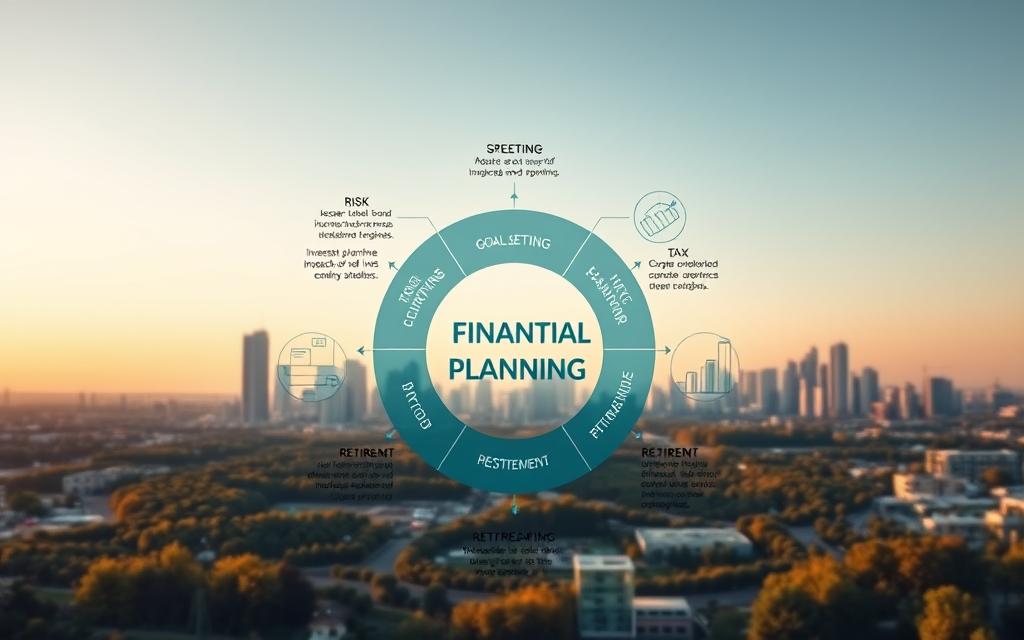Managing one’s finances effectively requires a comprehensive approach that considers all aspects of an individual’s financial life. Holistic financial planning is an integrated method that looks beyond isolated financial components, instead focusing on the complete financial picture.
This approach encompasses various elements, including investments, retirement planning, tax planning, and estate planning, to create a cohesive financial plan. By understanding the interconnectedness of these financial decisions, individuals can make informed choices that align with their personal goals and values.
A holistic approach to financial planning is designed to ensure that financial strategies are tailored to an individual’s unique needs and objectives, promoting financial stability and security.
Understanding Holistic Financial Planning
Understanding holistic financial planning requires a look into its core principles and how it diverges from traditional financial planning methods. Holistic financial planning is a comprehensive approach that considers all aspects of an individual’s financial situation to provide a tailored strategy.
The Definition and Core Principles
Holistic financial planning is defined by its comprehensive and integrated approach to managing finances. It involves understanding a client’s financial goals, values, and situation to create a personalized plan. The core principles include a focus on the client’s overall well-being, not just their financial assets. It’s about aligning financial decisions with personal values and goals.
A key aspect of holistic financial planning is its top-down approach, starting with the client’s objectives and working backward to create a strategy. This method contrasts with the bottom-up approach, which often focuses on specific financial products or services.
How It Differs from Traditional Financial Planning
Traditional financial planning often focuses on isolated aspects, such as investment management or product sales. In contrast, holistic financial planning takes a comprehensive view of a client’s financial situation, considering all factors that might impact their financial health.
| Aspect | Holistic Financial Planning | Traditional Financial Planning |
|---|---|---|
| Approach | Top-down, client-centered | Bottom-up, product-focused |
| Focus | Comprehensive, all financial aspects | Narrow, specific areas like investments |
| Advisor’s Role | Fiduciary, acting in the client’s best interest | May be driven by commissions or sales targets |
As
“A holistic approach to financial planning is not just about managing money; it’s about understanding the client’s journey and creating a tailored strategy.”
This highlights the importance of a comprehensive and client-centered approach in holistic financial planning.
What Does Holistic Financial Planning Mean in Practice?
A holistic financial plan is designed to align with a client’s overall vision for their life, incorporating their financial decisions and priorities. This approach considers various aspects of a client’s life to create a tailored financial strategy.
The Top-Down vs. Bottom-Up Approach
Holistic financial planning often employs a top-down approach, where the client’s overall goals and values are considered before making specific financial decisions. This is in contrast to a bottom-up approach, which focuses on individual financial products or services. By understanding what’s important to the client, holistic financial planners can create a more comprehensive plan.
Values-Based Decision Making
Taking the time to understand what is important to each client allows us to ensure that every financial plan is aligned with the individual’s personal values. For example, providing clients with the opportunity to invest in companies that aim to have a positive impact on society, through what is known as ‘sustainable’ or ‘ethical’ investing.
| Values-Based Decision Making | Traditional Financial Planning |
|---|---|
| Aligns financial decisions with personal values | Focuses on financial products and services |
| Considers the client’s overall vision for their life | Focuses on short-term financial goals |
| May include sustainable or ethical investing | Typically focuses on maximizing returns |

The Key Components of a Holistic Financial Plan
To achieve financial stability, it’s essential to understand the key components that make up a holistic financial plan. A comprehensive financial plan integrates various elements to ensure a secure financial future.
Investment and Retirement Planning
Investment and retirement planning are critical components of a holistic financial plan. This involves creating a tailored investment strategy that aligns with your retirement goals, risk tolerance, and time horizon. For more information on the benefits of holistic financial planning, you can visit this resource.
Tax and Estate Planning
Effective tax and estate planning are vital to minimize tax liabilities and ensure that your assets are distributed according to your wishes. This includes strategies for tax-efficient wealth transfer and the creation of wills and trusts.
Risk Management and Insurance
Risk management is a crucial aspect of a holistic financial plan, involving the use of insurance products to mitigate potential financial risks. Various types of insurance, such as life insurance, income protection, and long-term care insurance, can be incorporated into a holistic plan to safeguard against unforeseen events.
| Insurance Type | Purpose |
|---|---|
| Life Insurance | Provides financial support to dependents in the event of death |
| Income Protection | Replaces income if you’re unable to work due to illness or injury |
| Long-term Care Insurance | Covers costs associated with long-term care, such as nursing home fees |
A holistic financial planner assesses insurance needs based on individual circumstances, ensuring that the chosen insurance products are tailored to the client’s specific situation. By combining risk management strategies with wealth-building techniques, a holistic financial plan creates a balanced and resilient financial framework.
The Holistic Financial Planning Process
The holistic financial planning process is a comprehensive approach that involves several key steps to create a tailored financial plan. This process ensures that all aspects of an individual’s financial situation are considered and integrated into a cohesive strategy.
Setting Clear Financial Goals
Setting clear financial goals is the foundation of a holistic financial plan. This involves identifying specific objectives, such as retirement planning, tax efficiency, or investment strategies, and prioritising them based on importance and urgency. Clear goals enable advisors to create a personalised plan that addresses the individual’s unique needs and aspirations.
Assessing Your Current Financial Position
Assessing the current financial position involves a thorough analysis of the individual’s financial situation, including assets, liabilities, income, and expenses. This step provides a comprehensive understanding of the individual’s financial landscape, enabling the advisor to identify areas for improvement and opportunities for growth. Accurate assessment is crucial for developing an effective financial plan.
Developing and Implementing Your Plan
Developing and implementing the financial plan involves creating a tailored strategy that addresses the individual’s goals and current financial position. This includes prioritising recommendations based on urgency and impact, and coordinating with other professionals as needed. The advisor works collaboratively with the client to ensure that the plan is executed effectively and that the client understands each recommendation and its purpose within the broader financial plan.

The Role of Cash Flow Modelling in Holistic Planning
Holistic financial planners rely heavily on cash flow modelling to help clients understand the long-term implications of their current financial choices. This forward-looking approach offers clarity, showing the impact of key financial decisions such as retiring early, purchasing property, or increasing pension contributions.
How Cash Flow Models Work
Cash flow models provide a detailed projection of future financial scenarios, highlighting whether you’re on track or identifying gaps that need addressing. The outcome of this process is a comprehensive cash flow report that outlines potential future financial positions.
Using Projections to Guide Decision-Making
These projections serve as a decision-making framework, allowing clients to see the long-term impact of current choices. By quantifying the effects of different scenarios, holistic planners help clients make informed decisions, demonstrating the trade-offs between competing financial priorities.
Benefits of Taking a Holistic Approach to Your Finances
The holistic approach to financial planning is centered on the individual’s personal goals and aspirations, ensuring a more aligned and effective financial strategy. This approach considers the entirety of one’s financial situation, leading to more comprehensive and sustainable financial decisions.

Achieving Long-Term Financial Stability
A holistic financial plan helps individuals achieve long-term financial stability by considering all aspects of their financial lives. This includes investment and retirement planning, tax and estate planning, and risk management. By taking a comprehensive view, individuals can make more informed decisions that support their long-term financial goals. For more information on the benefits of holistic advice, visit MS Wealth Blog.
Aligning Financial Decisions with Personal Values
Holistic financial planning ensures that financial decisions align with personal values and priorities, creating greater meaning and satisfaction. By clarifying their values, individuals can use them as a framework for evaluating financial options and trade-offs, reducing financial stress and anxiety. This values-based approach leads to greater peace of mind and confidence in financial decisions, as they support a personally meaningful vision of success.
- Aligning financial decisions with personal values creates a sense of purpose and direction.
- Holistic planners help clients clarify their values and use them to guide financial decisions.
- This approach reduces financial stress by ensuring money decisions support personal priorities.
Working with a Holistic Financial Planner

To get the most out of holistic financial planning, you need to work with a qualified and experienced financial advisor. A holistic financial planner will consider your entire financial situation, including investments, taxes, and estate planning, to create a comprehensive plan tailored to your needs.
What to Look for in a Holistic Adviser
When selecting a holistic financial adviser, look for someone who is a fiduciary, meaning they are legally required to act in your best interests. Consider their experience, qualifications, and the services they offer. It’s also essential to assess their approach to financial planning and ensure it aligns with your goals and values.
Fee Structures and Fiduciary Responsibility
Understanding the fee structure of your holistic financial planner is crucial. Fee-only advisors charge clients directly for their services, while fee-based advisors may also earn commissions from product sales. Fee-only advisors are more likely to provide unbiased advice, as their compensation is not influenced by product sales. Ensure that your advisor is transparent about their fees and has a fiduciary responsibility to act in your best interests.
By choosing a holistic financial planner with a transparent fee structure and a commitment to fiduciary responsibility, you can trust that they are working to achieve your financial goals.
The Importance of Regular Financial Reviews
A key aspect of holistic financial planning is the regular review of your financial strategy to ensure it remains aligned with your goals. Regular financial reviews provide a structured way to measure progress toward established objectives and make necessary adjustments.
Adapting to Life Changes and Economic Shifts
Life is full of unexpected twists and turns, and your financial plan needs to be flexible enough to adapt to these changes. Regular reviews help you navigate through significant life events, such as marriage, having children, or switching careers, ensuring your financial strategy remains relevant.
Measuring Progress Toward Your Goals
Measuring progress toward your goals is crucial for staying motivated and on track. Holistic financial planners use benchmarks and milestones to track advancement toward both short-term and long-term financial objectives, helping you achieve goals and maintain peace of mind.
| Review Frequency | Benefits | Actions |
|---|---|---|
| Quarterly | Stay on track with financial objectives | Review budget and expenditure |
| Annually | Assess long-term progress | Rebalance investment portfolios |
| As needed | Adapt to significant life changes | Adjust financial plan accordingly |
By incorporating regular financial reviews into your holistic financial planning process, you can ensure that your financial strategy remains effective and aligned with your evolving situation. This proactive approach provides peace of mind, knowing that you are on track to meet your financial objectives.

Conclusion: Is Holistic Financial Planning Right for You?
Having examined the principles of holistic financial planning, it’s crucial to determine if this approach aligns with your financial objectives and values. This comprehensive strategy integrates various aspects of financial management, including investment, tax, and estate planning, to create a cohesive plan. It is particularly beneficial for individuals with complex financial situations or those undergoing significant life changes. To decide if holistic financial planning is right for you, consider your financial complexity, need for integration, and desire for comprehensive guidance. Researching a qualified financial advisor can help you make an informed decision.











